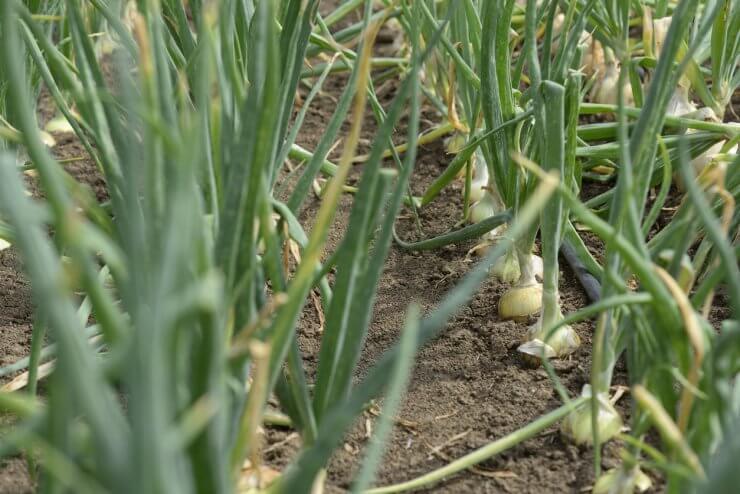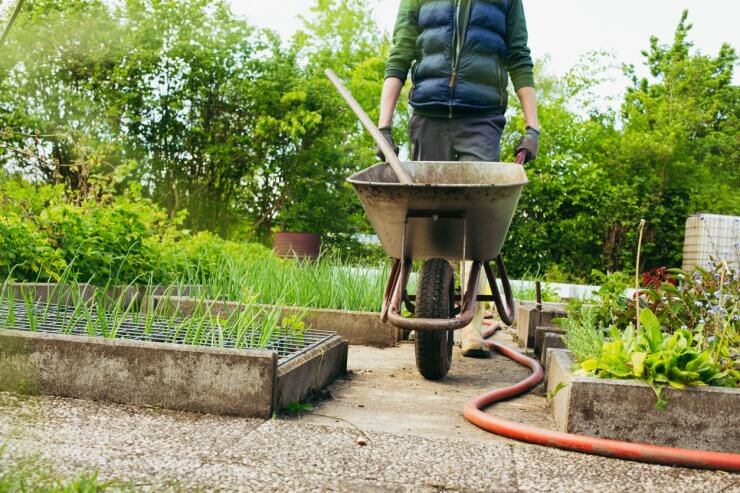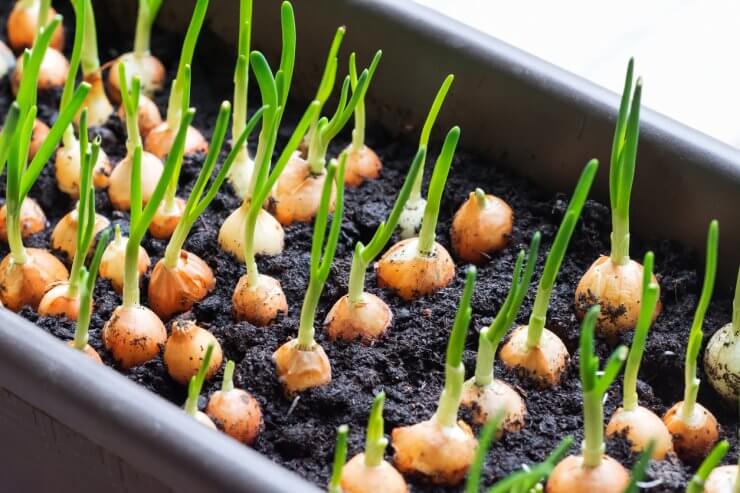
Growing onions in open land
Onions are easy to plant and grow; the key for successful onions is the right amount of sunlight.
If you have a large outside plot of land with the right soil and the right conditions for watering and draining, you might have the ideal situation for planting your onions directly in the ground. But if your soil has too much clay or gets soggy, you might want to consider planting in raised beds or in containers where your onion plants will have better drainage.
Growing in Raised Beds

Onions growing in raised beds
Raised beds are a great option for growing onions if you have perpetually wet, heavy soil. Creating raised beds for your onion garden can be a lot of work the first time you set up your beds but having raised beds gives you more control over your growing environment. You’ll discover that watering, irrigation, weeding, and even harvesting are much easier, with items closer to your reach and contained in a space that is more manageable than growing in open land.
To create nicely contained raised beds for your onions, enclose your raised beds with wooden sides 18 to 20 inches deep—this will give you plenty of room for drainage. It will also give you more options for the types of plants to grow in the raised beds.
If all you’re growing in your raised bed is onions, then you can get by with sides that are about 8 inches high. But don’t plan to grow crops with long taproots in a shallow bed; you’ll need a deeper bed for that.
Another benefit of a raised bed garden—it’s less likely to contain the seeds of weeds that often crop up in garden soil. You’ll minimize the incidence of weeds overall, which will save you time and effort later. Weeding itself is much easier with raised beds, because you don’t have to get down so far on the ground to remove weeds.
Raised Bed Planting Tip: Be sure to amend your soil with compost at least once a year. Otherwise, your soil can become less productive for your plants. Check out the specific soil requirements for the onions you’re going to plant so you can give them a welcoming space to grow in.
Growing Onions in Containers or Pots

Onion in container
If you don’t have the space for growing in open land or in raised beds—let’s say you live in an apartment with no land of your own for a garden—you can grow onions in containers or pots on your balcony, porch, patio, or deck.
One great advantage to container gardening is that you can move plants around more easily to maximize their exposure to the sun. And if you’re growing long day varieties, you want to make sure your onions are getting all the rays they need to form big, juicy bulbs.
Tip: If you have trouble moving pots around, because they’re too heavy or too bulky, try putting your pots on slightly raised rolling casters so you can more easily move them around your space.
Onion plants have shallow roots, but don’t skimp on the soil. Half barrels or 5-gallon tubs work well. Just make sure the pots have drainage holes. Also, though they’re pretty, avoid ceramic and terra cotta pots as they might crack as they freeze and thaw during the winter. Fill the containers with potting mix, not ground soil (you don’t want to transplant weed seeds), and add organic fertilizer just after planting.
Though weeding is much easier with containers, you have to be more vigilant about watering and irrigation as plants can dry out much faster than when they’re in the ground—but overwatering your onions can cause root rot. Plus, containers can lose important soil nutrients throughout the season, so you might need additional fertilizer.
At the end of the growing season, plan to replace the nutrients lost in the soil with fresh potting soil. Onions aren’t real heavy feeders, so in this case you probably won’t have to worry about excessive soil depletion. But that planter will definitely need a refresher come the next season.
How do you grow your onions—in open land, in raised beds, or in containers? Why do you prefer your method? Please tell us your tips and tricks for creating a bountiful onion garden.


 Previous
Previous

